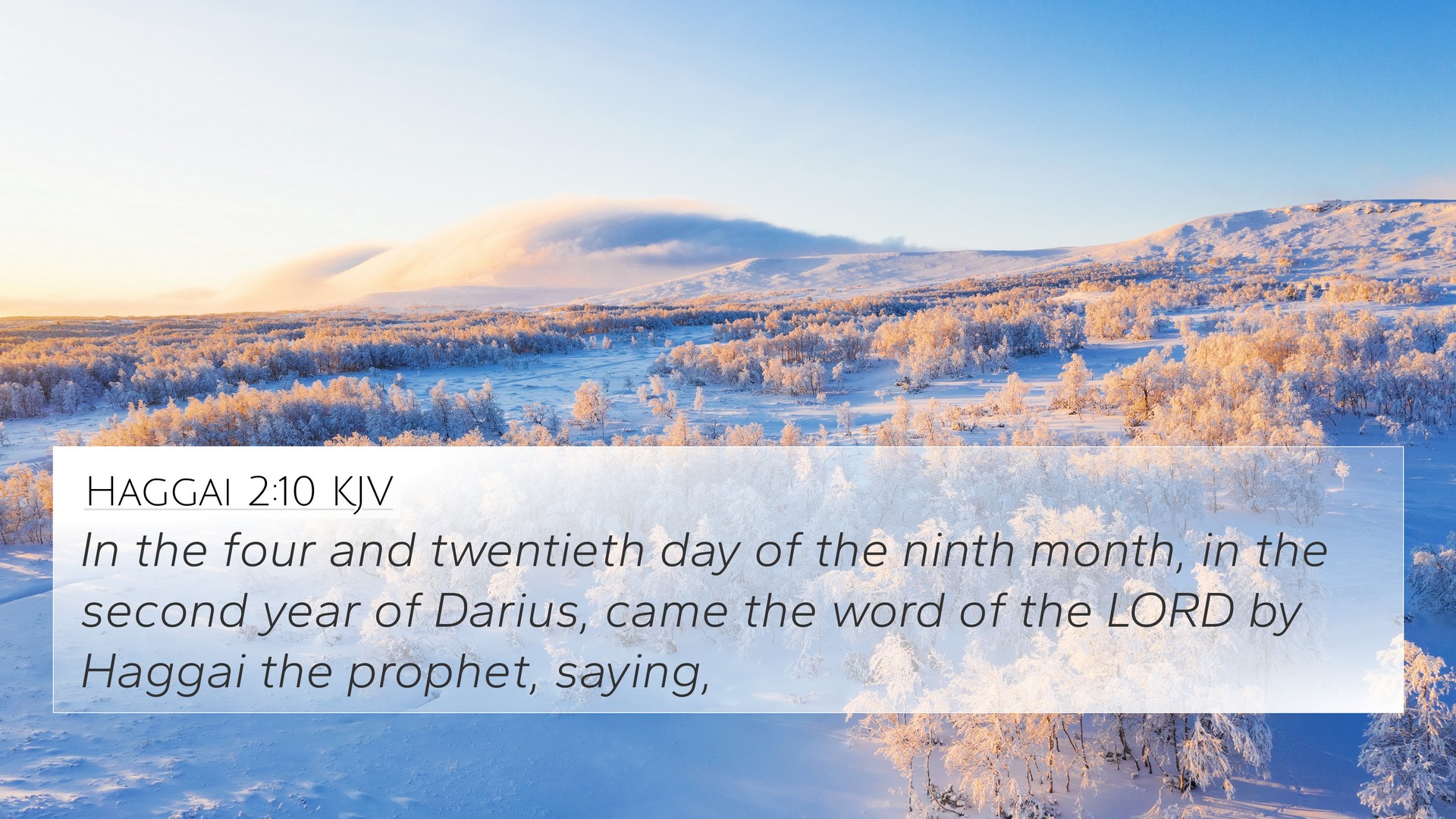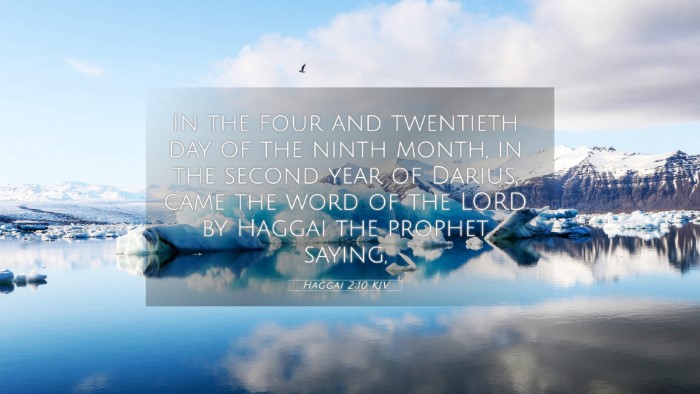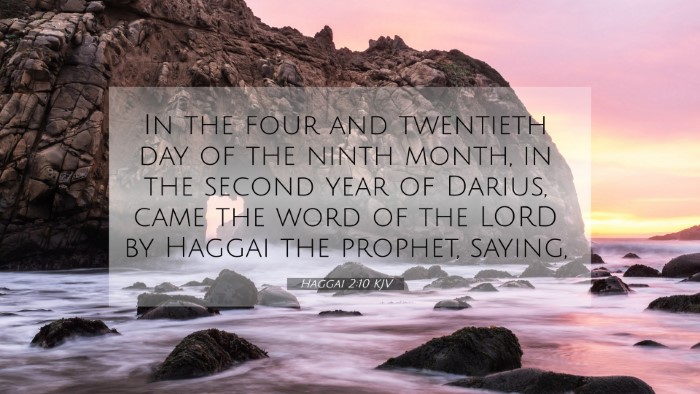Old Testament
Genesis Exodus Leviticus Numbers Deuteronomy Joshua Judges Ruth 1 Samuel 2 Samuel 1 Kings 2 Kings 1 Chronicles 2 Chronicles Ezra Nehemiah Esther Job Psalms Proverbs Ecclesiastes Song of Solomon Isaiah Jeremiah Lamentations Ezekiel Daniel Hosea Joel Amos Obadiah Jonah Micah Nahum Habakkuk Zephaniah Haggai Zechariah MalachiHaggai 2:10 Similar Verses
Haggai 2:10 Cross References
In the four and twentieth day of the ninth month, in the second year of Darius, came the word of the LORD by Haggai the prophet, saying,
Uncover the Rich Themes and Topics of This Bible Verse
Listed below are the Bible themes associated with Haggai 2:10. We invite you to explore each theme to gain deeper insights into the Scriptures.
Haggai 2:10 Cross Reference Verses
This section features a detailed cross-reference designed to enrich your understanding of the Scriptures. Below, you will find carefully selected verses that echo the themes and teachings related to Haggai 2:10 KJV. Click on any image to explore detailed analyses of related Bible verses and uncover deeper theological insights.
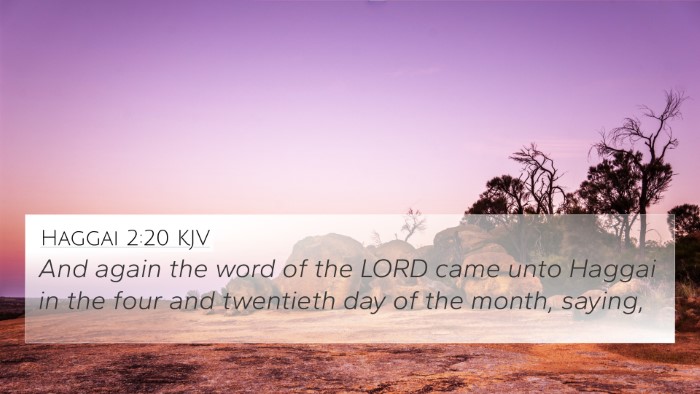
Haggai 2:20 (KJV) »
And again the word of the LORD came unto Haggai in the four and twentieth day of the month, saying,
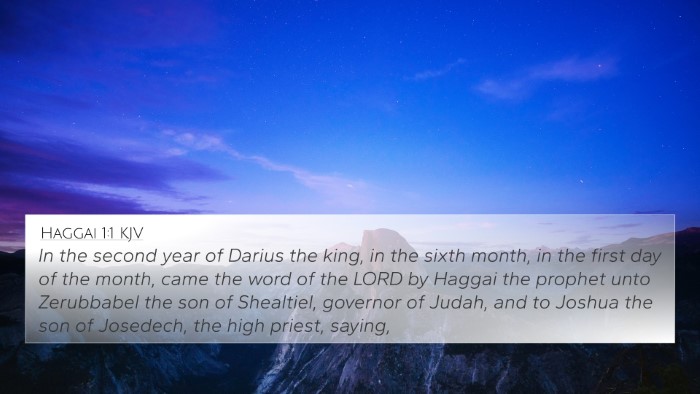
Haggai 1:1 (KJV) »
In the second year of Darius the king, in the sixth month, in the first day of the month, came the word of the LORD by Haggai the prophet unto Zerubbabel the son of Shealtiel, governor of Judah, and to Joshua the son of Josedech, the high priest, saying,
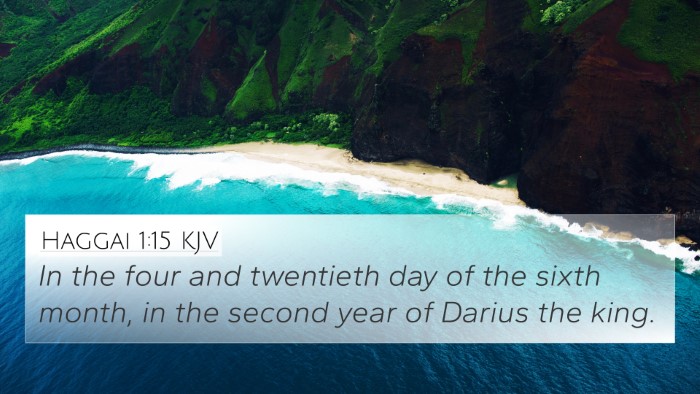
Haggai 1:15 (KJV) »
In the four and twentieth day of the sixth month, in the second year of Darius the king.
Haggai 2:10 Verse Analysis and Similar Verses
Understanding Haggai 2:10
Haggai 2:10 (KJV): "In the four and twentieth day of the ninth month, in the second year of Darius, came the word of the Lord by Haggai the prophet, saying,"
Meaning and Interpretation
The verse marks a specific date for a prophetic message delivered by Haggai, providing a historical context that signifies God's active engagement in the lives of His people. It highlights the significance of timing in God’s revelations, indicating that God communicates with His people at appointed times, chosen for their importance in His divine plan.
Insights from Commentaries
- Matthew Henry: Henry points to the precision with which God’s messages are delivered, emphasizing that noting the specific date shows the accuracy of prophetic timings as aligned with historical events. This emphasizes God’s sovereignty and His commitment to His people during the rebuilding process after exile.
- Albert Barnes: Barnes notes that the month mentioned correlates with the Jewish calendar and connects to themes of restoration and hope. He emphasizes how Haggai's role as a prophet at this time aligns with God’s promise to bring comfort and resurgence to the people of Israel.
- Adam Clarke: Clarke highlights the relevance of the month as a time significant in Jewish history. He elaborates on the prophetic significance, showing how God's word at this time pertains to the temple's construction and God’s presence among His people, which is foundational for their identity and worship.
Cross-Reference Verses
To deepen our understanding of Haggai 2:10, several Bible verses can be seen to connect thematically or contextually:
- Ezra 1:1-3: The proclamation by Cyrus that the temple in Jerusalem should be rebuilt signifies the beginning of a restoration, paralleling the messages of Haggai concerning the temple’s importance.
- Isaiah 40:1-2: This prophecy of comfort aligns with Haggai's message to encourage the people during the rebuilding phase.
- Haggai 1:1: The introduction of Haggai’s prophetic ministry sets the stage for the urgent messages regarding the reconstruction of the temple.
- Zechariah 1:1: Like Haggai, Zechariah received messages from God during the post-exilic period, underscoring the continued divine interaction with His people.
- Malachi 1:14: Malachi also addresses issues of reverence towards God, which connects to the purposes behind rebuilding the temple.
- 2 Chronicles 36:22-23: This passage describes God stirring Cyrus's heart to rebuild the temple, providing context to Haggai's timeline and purpose.
- Jeremiah 29:10-11: The promises of hope and future plans for Israel resonate with the messages delivered through Haggai as God reassures His people of their restoration.
Thematic Connections
Haggai 2:10 emphasizes the importance of restoration, divine timing, and the call to recognize God's continual presence. The connections between these verses help illustrate the broader narrative of God’s redemptive work:
- Restoration: The ongoing theme throughout the prophetic books as God calls His people back to Himself.
- Divine Presence: God’s commitment to dwell among His people, emphasized in the temple's construction.
- Hope and Encouragement: The prophetic words serve to uplift and remind the people of God’s enduring faithfulness.
Conclusion
In summary, Haggai 2:10 stands as a pivotal verse that not only highlights the prophetic utterance concerning the temple's reconstruction but also serves as an anchor point in understanding the interconnectedness of God’s promises and actions across Scripture. By recognizing its significance, believers are encouraged in their faith journey, understanding their role in God’s unfolding narrative.
Additional Resources for Cross-Referencing
- Bible Concordance: Utilize a concordance to find words and themes across the Bible easily.
- Bible Cross-Reference Guide: These guides help identify verses that relate to one another.
- Cross-Referencing Bible Study: Engage in studies that specifically explore connections between verses.
- Comprehensive Bible Cross-Reference Materials: Such resources provide deeper insights into scriptural connections.
